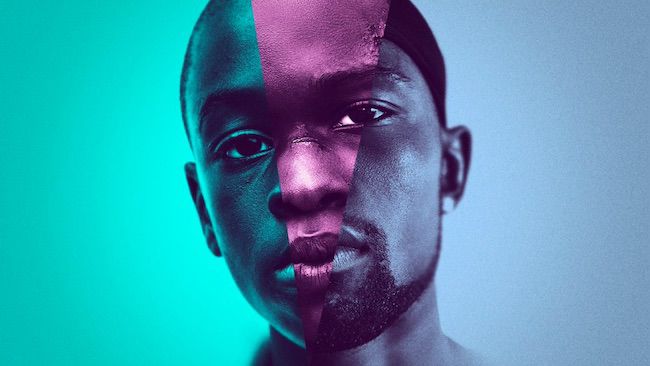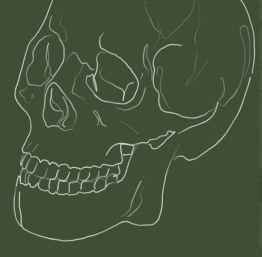The case for Moonlight as Best Picture
March 23, 2017
I am having a difficult time reviewing Moonlight because it captures and evokes feelings indescribable. The film delivers a straightforward plot, in which a gay boy is terrorized until he rebuilds himself as a hardened man, isolated from anyone who could make him vulnerable. Director and writer Barry Jenkins fluidly moves us from one act to another as the protagonist Chiron grows from boy to teen to adult. However, it is the quiet moments which make the movie a crystalline beauty and singular achievement of filmmaking.
Moonlight is a spectacularly quiet movie. Chiron speaks rarely in each act. When he does talk he struggles to find the words he wants, often stumbling as he tries to express himself to others. Yet soft-spoken Chiron draws the audience into the crevasses of his life with such power and beauty that Moonlight, the little movie that could, must be recognized as a triumph of cinema’s capabilities and the best film of 2016 at this weekend’s Academy Awards ceremony.
If the Obama era was about struggling with our identity as a nation and reforming our ideas about leadership, love and the dignity we owe each other, Moonlight’s late 2016 release aptly serves as one of the period’s final cultural artifacts. Moonlight deftly depicts the dangers of homophobia, the absolute innocence of homosexuality, and the lingering nature of love given freely. Seeing the child Chiron expressing himself freely brings as much of a smile as the teenager’s caged nature and fear cause tears. Chiron struggles with his gayness while attempting to avoid his crack addicted mother, the bullies who love to abuse him, and the intolerable loneliness of his life. The rare moments of joy we witness him experience feel like deep gulps of air after suffocating. And those feelings, more than the plot itself, make this a magical piece of art.
Based on Tarell Alvin McCraney’s autobiographical piece In Moonlight Black Boys Look Blue, Moonlight centers on Chiron and his experiences growing up black and gay in a Miami ghetto consumed by crack cocaine and poverty, terrorized by his peers’ homophobic violence. In his first scene shouts of “faggot” can be heard as local boys chase him into an abandoned building. The only relief comes from the benevolence of crack kingpin Juan and Teresa, Chiron’s surrogate parents. His single mother Paula acts as both his guardian and tormentor. Chiron’s only friend his age is Kevin. This small band of characters drive most of the film, revealing their interiorities to one another slowly and painfully.
The slow moments have stayed with me most since I saw Moonlight in mid-January. There’s the scenes of Chiron bathing in ice, a hand grasping sand in the beach, longing looks and longer shots of figures bursting with emotion. Jenkins and his cinematographer James Laxton capture some of the most magnificent shots I have ever seen on film, especially of black skin. The closeups revel in black beauty and pain, so often expressed in the simultaneously. The Miami heat is palpable through the screen, and every character presents themselves as completely natural outgrowths of their environs.
Each actor subtly slips into their roles with technical brilliance. Mahershala Ali and Naomie Harris, nominated for their own Oscars, bring to Juan and Paula layers of humanity unimpeachable even in their darkest moments. Ali and Harris turn their drug dealer and addict, roles often relegated to minor black side characters, into living, breathing, aching studies of lives both trapped and free. Their interactions with Chiron, played by Alex Hibbert, Ashton Sanders and Trevante Rhodes, often evoke complex issues with emotions rather than dialogue. Janelle Monae turns in a fine performance as Teresa, though one wishes her character had more to do. The adult Chiron and Kevin, Rhodes and Andre Holland respectively, conjure understated yet magnetic presentations clearly in line with their younger selves.
There is more and more I could say about Moonlight without saying anything important. Nicholas Brittell’s score is fantastic, and the licensed music particularly effective. The movie does not overstay its welcome. The script’s tightness works wonderfully. Etc. etc.
Moonlight comes from all of the aforementioned and rises to be more than the sum of its parts. Viewing Moonlight means viewing McCraney’s soul and walking away a better person. The film bears an incredible specificity to its origins, in the broken home where he came to understand his nature as a gay black man. Jenkins and his actors create a skillful portrayal of that nature, its infinite complexities and dazzling brilliance, unvarnished by any attempts at universalization or softening of the edges. Moonlight becomes all the more honest and human for it. At once ephemeral and eternal, just as its namesake, this picture’s spirit lingers within its viewers hearts and minds long after credits roll.
If that is not the point of cinema, the Oscar can go to another of the worthy Best Picture nominees, as I predict it eventually will. But if it is, then Moonlight, as fine a film as I have ever known, deserves the golden statue.


















